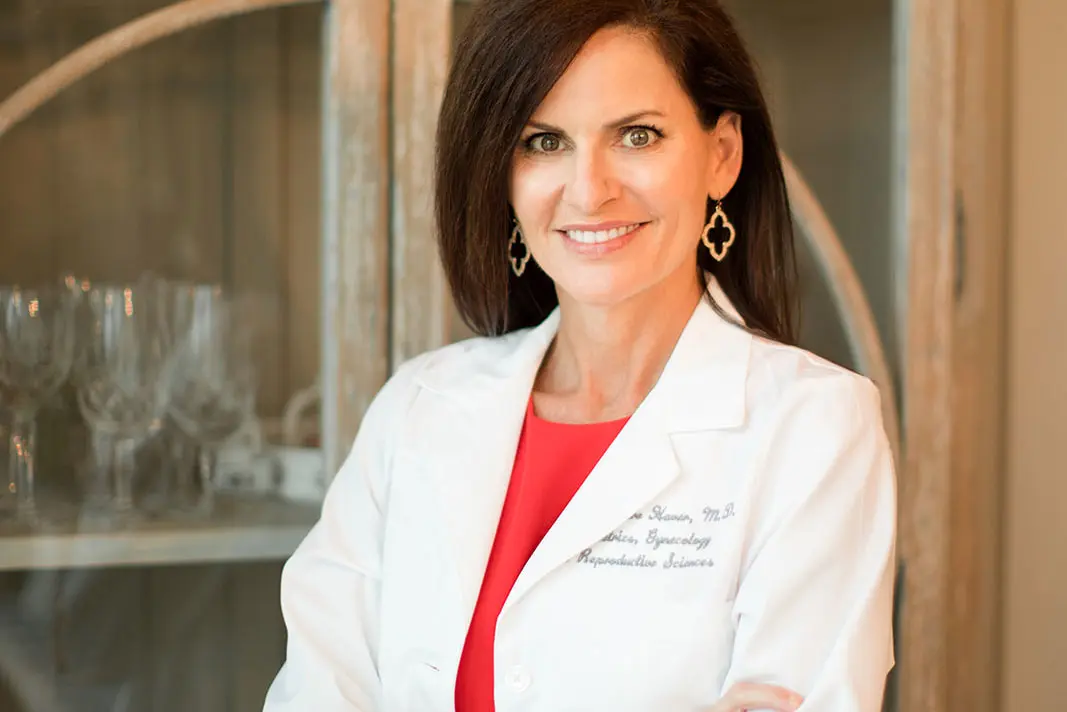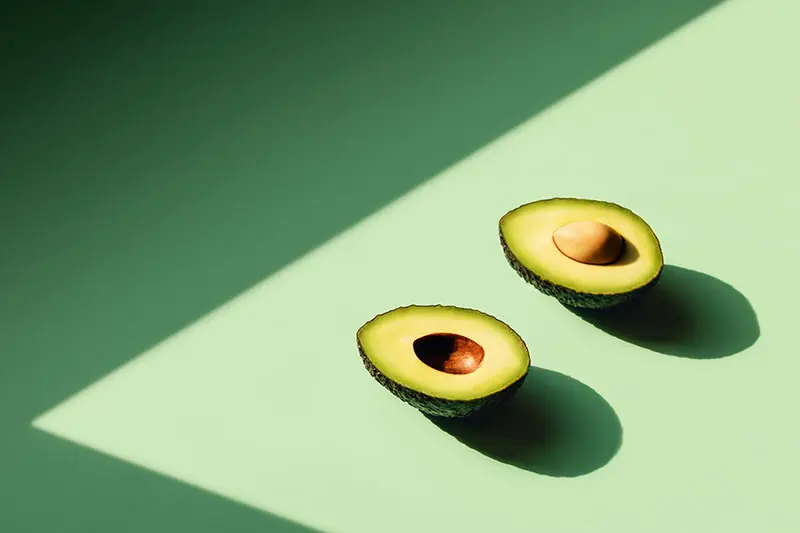What’s the Best Way to Eat During Menopause?
6 minute read

Summary
Board-certified OB-GYN Dr. Mary Claire Haver discusses the best way to eat during menopause, emphasizing the importance of anti-inflammatory nutrition, whole grains, fruits, vegetables, and healthy fats to help manage symptoms and reduce visceral fat. The conversation covers the role of estrogen in the body, the benefits of hormone replacement therapy (HRT), and the impact of intermittent fasting, providing practical dietary strategies for women experiencing perimenopause and menopause.
Figuring out the best way to feed ourselves can be really, really complicated. And, like everything else, it’s even more complicated during menopause. Recently, Alloy co-founder Anne Fulenwider went live on TikTok with Dr. Mary Claire Haver, a board-certified OB-GYN and the creator of the Galveston Diet. Below is some of the interview, which has been edited for brevity and clarity. Watch the whole interview here.
Dr. Mary Claire Haver:
Hi!
Anne Fulenwider:
Hi! I’m so glad to meet you. I’ll let you introduce yourself.
Dr. Mary Claire Haver:
I’m Dr. Haver, and I’m a board-certified OB-GYN focused on the care of menopausal women. I’ve also had a six year journey becoming certified in nutrition and medical nutrition, creating the Galveston Diet, and then opening up my clinic.
One of the questions I get the most is about how to find good menopause care. I actually have people fly to come see me, which is flattering, but also ridiculous. You should be able to find good care wherever you are.
Anne Fulenwider:
I want to talk to you about what we’re going to do to fix that! My company is called Alloy.. I started it with a friend, Monica Molenaar, who went into surgical menopause at 40. She took five years and five doctors or more to figure out how to actually take care of herself, and it was a really grueling journey for her. For me, I didn’t even realize until we had already started the company that I actually was already in perimenopause, because I didn’t even know the symptoms. Thanks to Alloy, I’m able to manage them.
Alloy is a telehealth company where you give your medical history and share your symptoms and a board-certified, menopause trained doctor will give you treatment recommendations. If you purchase a treatment, we deliver your prescriptions right to you
Dr. Mary Claire Haver:
Menopause is not prioritized. It’s at the bottom of the barrel for research. It’s at the bottom of the barrel for treatment…
In my own training, I spent four years doing obstetrics and gynecology in a traditional OB-GYN residency. And then I spent about 12 years as a program director. More than 50% of our training is in obstetrics. The next 45% gets divided up between pediatrics, oncology, fertility, reproductive endocrinology, and menopause is a tiny, tiny sliver of that pie. You’ve probably seen the study that the Mayo Clinic did where they asked OB-GYN residents whether they feel ready to take care of menopausal patients, and 75% of them said no. And then in practice, only one in ten felt competent. And there’s no training in perimenopause at all.
Anne Fulenwider:
Why aren’t they teaching this in medical school?
Dr. Mary Claire Haver:
In medical school we learn, essentially, that menopause is the end of your reproductive cycles. And that’s it. We don’t learn about the cardiovascular risks, the neurological risks, or any health risks at all.
Anne Fulenwider:
Wow. So, how did you decide you wanted to devote your life to serving menopausal women?
Dr. Mary Claire Haver:
It was a process. And it all kind of started for selfish reasons. I was struggling with my own menopause and dealing with some very unexpected weight gain. I was grieving the death of my brother, and I was kind of a basket case. When the grief started to lift and I was trying to get back to myself, I started working out a ton and restricting my calories. I mean, I was doing two-a-days at the gym. And it wasn’t working. So I called up the PhD nutritionist at the university I was employed at, and I was like, what the hell is going on? And I learned that during menopause, you gain weight in your midsection and that that fat can be dangerous and linked to hypertension and chronic disease. And I learned that nutrition can go a long way.
I went down a rabbit hole, learning about menopause, inflammation, nutrition, and intermittent fasting, and I found a program at Tulane called Culinary Medicine. I enrolled there, learned a ton, and ended up developing my program. I gave it to my patients and friends, and then I took it to social media, and people were receptive.
I gave the program away for free for about a year and a half, because I already had a job. I got feedback, grew my social media presence, and it started to take on a life of its own. I developed an online course and it blew up. People want to talk about nutrition and menopause.
Anne Fulenwider:
There’s such a hunger out there.
Dr. Mary Claire Haver:
Ultimately, I built my clinic, and we opened in October of 2021.
Anne Fulenwider:
Congratulations! That’s actually when we started Alloy. Let’s talk a little bit about the diet.
Dr. Mary Claire Haver:
The diet stresses whole grains, fruits, vegetables, you know, things that naturally fight inflammation. We encourage healthy fats like nuts, avocado, and seeds, which are not only packed with healthy fats, but also have omegas and fiber and vitamins and minerals. It's just kind of reshifting everything while making sure you stay full and satisfied. And you won’t have as many cravings, because your blood sugar will stabilize.

Anne Fulenwider:
You're the first person who's ever told me that I can eat a whole avocado in a day!
Dr. Mary Claire Haver:
Staff teases me at the clinic, they're like, “An avocado a day keeps the visceral fat away!” Another component of the Galveston Diet is intermittent fasting.
Anne Fulenwider:
That’s the part I have to figure out. Because, black coffee in the morning? I Just can’t quite get there.
Dr. Mary Claire Haver:
So make that your first goal. Like, don't worry about fasting or anything. Just give yourself two weeks to slowly decrease the additive, whatever you were doing to make your coffee wonderful. Go slow. That’s what I did. Now I can’t imagine putting anything in my coffee!
Anne Fulenwider:
Can you talk a little bit about estrogen?
Dr. Mary Claire Haver:
There are estrogen receptors in almost every organ system in our body. Besides the ones we know about, like your breasts, the general urinary system, and your uterus, there are estrogen receptors in our brains, on our tongues, on every mucus membrane, in our skin, bones, joints–everywhere. During perimenopause and menopause, we lose that estrogen. And everyone’s journey is different. 85% of us will have hot flashes, but that’s where the similarities end. I might have horrific joint pain, migraine headaches, and gastrointestinal disturbances, and you might have crippling anxiety, new depression, ADHD, frozen shoulder, and sleeplessness.
And the beautiful thing about estrogen is it can help almost everything.
Including the dreaded menopausal weight gain. No one’s doing studies on estrogen right now (of course), But they do do look backs. Which means they take a group of women who started hormone treatment early in menopause, and another group of women who didn’t. And then they look at both groups after ten years, and the women who took HRT had lower visceral fat accumulation, lower diabetes, and lower osteoporosis.
Anne Fulenwider:
One question we get asked all the time is, do we have to test for estrogen?
Dr. Mary Claire Haver:
It’s not necessary. If someone knows what they’re doing, it takes one conversation to determine if you’re menopausal. If you are over the age of 45, and you haven’t had a period in one year, you are a postmenopausal woman.
Anne Fulenwider:
And what about perimenopause?
Dr. Mary Claire Haver:
First of all, I cannot tell you the number of people I talk to on social media who have come to me and said that their doctor doesn’t believe in perimenopause. It’s not Santa Claus. And you absolutely can be treated for it.
Anne Fulenwider:
It's so important to get voices like yours out there!
Dr. Mary Claire Haver:
It doesn’t have to be so complicated!
Anne Fulenwider:
We’re just proud to be part of the solution.
To see the whole interview, click here: https://youtu.be/L7Z_Vm3mnEA
A huge thanks to Dr. Mary Claire Haver for sitting down with us! And in case you missed our webinar with Dr. Haver and Alloy Medical Advisor Dr. Corinne Menn, click here to watch!
Follow us on social media and sign up for our emails to learn about all of our events.
Subscribe
Go ahead, you deserve to
feel fantastic
By subscribing you agree to our Terms of Service & Privacy Policy.